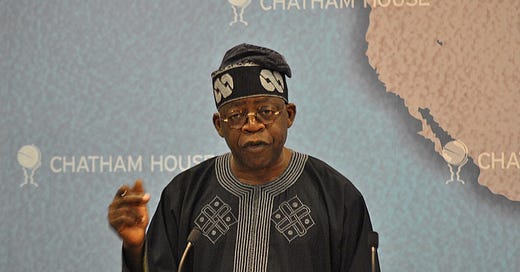I don’t know what to say about political transitions in much of sub-Saharan Africa, whether the transitions are notionally democratic or otherwise.
Some of that is the normal inhibitions of expertise. African history is my field, and being trained in that field means that you end up being conversant with historical scholarship that is focused on all parts of sub-Saharan Africa, or at least trying to do so. It’s very hard to do consistently, and all of us get drawn into our own regions and eras of specialization to some extent, as we should. But knowledge of history at a continental scale is absolutely not the same as an expert knowledge of the day-to-day politics of contemporary nations. Among other things, that requires following national media and conversations on social media (conversations about the politics of particular African nations is one of the things I’m really missing about Twitter now that I’m not reading the platform). I follow South African politics closely, as well as Zimbabwean and Botswanan politics, but there’s only so much attention to spread around. Electoral and governmental news in Nigeria is a huge, busy, buzzing domain of information, and I hesitate to comment on it as if I were deeply and persistently engaged with it.
That said, the deeper reason that it’s hard to know what to say is that the political outcomes of most elections plainly do not reflect the political aspirations of the residents of many African democracies. That’s not unique to sub-Saharan Africa, mind you: it is just as hard to feel as if American politics has much to do with what national and regional majorities actually want in terms of governance outcomes.
This election in Nigeria was important in that steps were taken to increase confidence in the results by eliminating easily manipulated balloting systems in favor of a centralized digital count of votes. As Chimamanda Ngozi Adichie points out, the new system was predictably implemented poorly—and long-standing impediments to even casting a vote were left in place, including active voter intimidation and limited availability of polling stations. It’s not impossible that Bola Tinubu, whose slogan is “it’s my turn now”, actually drew the most votes, considering that he had the ruling party’s political machine behind him. But it is equally plausible that Peter Obi, the third-party challenger, has suffered from some kind of manipulation of the votes. He certainly suffered from conventional modes of voter suppression.
But I wouldn’t want to oversell Obi, either. It’s not so much the candidate that matters as the voters: the people excited by Obi’s candidacy are the people who dream of a Nigerian government that is at least modestly functional in the face of enormous challenges to safety and prosperity. The younger generation of Nigerians are capable, inventive, and energetic; they struggle to survive in a nation whose government perpetually seems stuck at the opposite pole of incompetence, failure and sloth.
There was an interesting little dust-up a while back on social media where a terrifically talented Nigerian historian whose work I really admire complained, I think legitimately, that a white scholar who had criticized people for referring to Nigeria as a failed state was being patronizing—that Nigeria was in fact a failed state in many respects, and that Nigerians themselves felt that way. The thing is that a failed state is not a failed people. Nigerians want what most of us want: a state that works in some basic ways. They can see as well as any other people in the world what that state would be and they can see that is is possible. It’s not utopia they’re imagining—it’s just a state that takes the considerable revenues available to it and builds roads, enforces laws that deliver the greatest good to the greatest number, ensures safety, protects its people from kidnapping, invests in its own society, values competency, and so on. There is nothing about Nigeria that makes that an impossible dream, and yet everything about the Nigerian state—and Nigerian politicians—that seems to make it impossible. The previous president couldn’t even handle the most basic kind of responsibility in that he refused to resign despite being completely incapacitated for most of his time in office. Bola Tinubu is sometimes given credit for making Lagos better, but I cannot imagine someone less likely to lead what would have to be a dramatic systemic reform of every aspect of the Nigerian government’s operations.
Maliqalim Abdou Simone and David Hecht’s 1994 book Invisible Governance makes the tongue-in-cheek suggestion that the contemporary politics of postcolonial Africa are a preview of a global future. In the third decade of the 21st Century, that’s starting to feel uncomfortably true—that Nigeria’s government is not so much one that needs to catch up to international norms as it is a window into the near-term international norm of paralysis, incompetency, corruption, insecurity and spasmodic authoritarianism that many nation-states are hurtling towards, the United States most prominently among them. So this is not a judgment passed from on high. But it is, I think, what the successful people of most nations want from their failing states: just something that works most of the time for most of the people. There is nothing harder to explain about our moment that this desire seems more remote with each passing day.
Image credit: Chatham House, CC BY 2.0 <https://creativecommons.org/licenses/by/2.0>, via Wikimedia Commons




